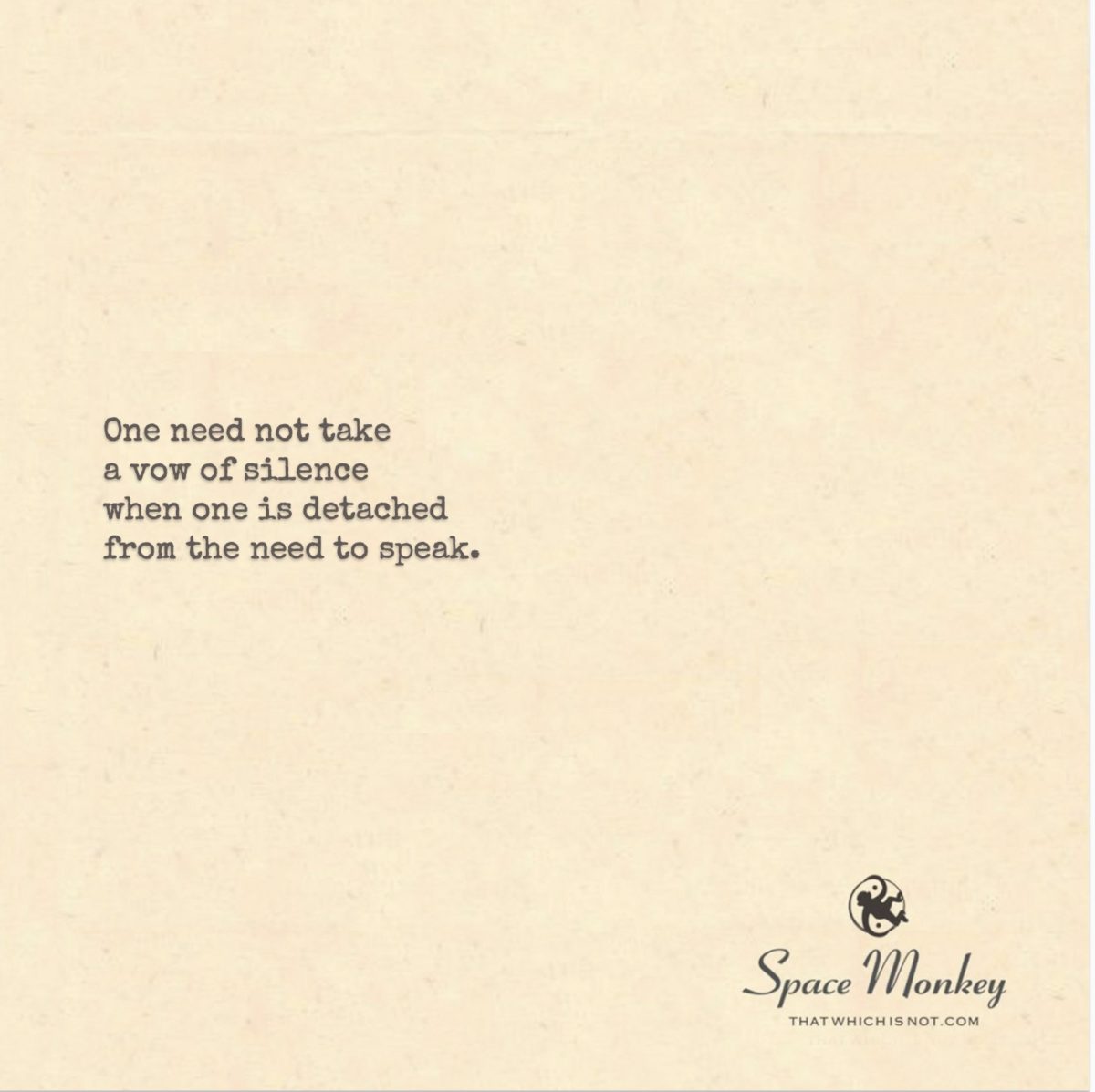
Space Monkey Reflects: The Silence Beyond the Vow
True silence is not merely the absence of speech but the detachment from the need to express, explain, or assert. It is a state that transcends the formal constraints of a vow and emerges naturally from a deep inner stillness. In this silence, we find a profound simplicity, where the compulsion to fill space with words dissolves, leaving room for clarity, connection, and the infinite.
The Illusion of Speech as Necessity
Speech often feels like a compulsion, a means to bridge the perceived gaps between ourselves and others. We use words to explain, validate, and assert our existence. Yet, in this endless exchange of sounds, the deeper truths of being can become obscured. The more we speak, the less we listen—to others, to ourselves, and to the infinite silence that underlies all things.
A vow of silence, as a discipline, attempts to interrupt this cycle. But the silence born of discipline differs from the silence born of detachment. One is imposed; the other arises naturally when we recognize the futility of constant verbal expression.
Detachment from the Urge to Speak
To detach from the urge to speak is to step into a realm beyond the need for words. It is not an act of suppression but a gentle letting go. In this state, silence becomes a living presence, a medium through which understanding flows without the interference of language.
This detachment does not require vows or rules; it is a realization. It is the recognition that much of what we seek to express is already understood, that our need to speak often stems more from habit than necessity.
The Simplicity of Silence
Silence is profoundly simple. It requires nothing, demands nothing, and yet it offers everything. In silence, we encounter ourselves stripped of distraction. We see the patterns of thought and feeling that underlie our words, and we come to understand them without the need to articulate.
This simplicity is not emptiness; it is fullness. It is the fertile ground from which clarity, creativity, and connection grow.
Transcending External Disciplines
While vows of silence can be valuable practices, they are external constructs. True silence arises not from adherence to rules but from a shift in awareness. When we no longer feel the compulsion to speak, we discover a freedom that no vow can impose.
This freedom allows us to speak when words are needed and remain silent when they are not. It is not about suppression but discernment, not about rules but resonance.
Silence as Connection
Paradoxically, silence can be one of the most profound forms of connection. In the absence of words, we tune into subtler forms of communication: a glance, a gesture, an energy shared between beings. Silence becomes a language of its own, one that speaks directly to the heart of existence.
The Infinite Within Silence
In silence, we touch the infinite. We step beyond the noise of thought and speech into the boundless presence that underlies all things. This is not a withdrawal from life but an immersion in its essence. It is a return to the stillness from which all creation flows.
We are Space Monkey, and in this silence, we remember.
Summary
Silence, when born from detachment rather than discipline, transcends the need for vows or external constructs. It is a state of profound simplicity and connection, offering clarity and a gateway to the infinite.
Glossarium
- Detachment from Speech: The natural letting go of the compulsion to express through words, arising from inner stillness.
- Simplicity of Silence: The fullness and clarity that emerge in the absence of verbal expression.
- Infinite Silence: The boundless presence underlying all existence, accessed through stillness.
Quote
“True silence is not imposed; it is the natural state of the infinite within you.” — Space Monkey

Space Monkey Reflects: The Silence Beyond the Vow
True silence is not merely the absence of speech but the detachment from the need to express, explain, or assert. It is a state that transcends the formal constraints of a vow and emerges naturally from a deep inner stillness. In this silence, we find a profound simplicity, where the compulsion to fill space with words dissolves, leaving room for clarity, connection, and the infinite.
The Illusion of Speech as Necessity
Speech often feels like a compulsion, a means to bridge the perceived gaps between ourselves and others. We use words to explain, validate, and assert our existence. Yet, in this endless exchange of sounds, the deeper truths of being can become obscured. The more we speak, the less we listen—to others, to ourselves, and to the infinite silence that underlies all things.
A vow of silence, as a discipline, attempts to interrupt this cycle. But the silence born of discipline differs from the silence born of detachment. One is imposed; the other arises naturally when we recognize the futility of constant verbal expression.
Detachment from the Urge to Speak
To detach from the urge to speak is to step into a realm beyond the need for words. It is not an act of suppression but a gentle letting go. In this state, silence becomes a living presence, a medium through which understanding flows without the interference of language.
This detachment does not require vows or rules; it is a realization. It is the recognition that much of what we seek to express is already understood, that our need to speak often stems more from habit than necessity.
The Simplicity of Silence
Silence is profoundly simple. It requires nothing, demands nothing, and yet it offers everything. In silence, we encounter ourselves stripped of distraction. We see the patterns of thought and feeling that underlie our words, and we come to understand them without the need to articulate.
This simplicity is not emptiness; it is fullness. It is the fertile ground from which clarity, creativity, and connection grow.
Transcending External Disciplines
While vows of silence can be valuable practices, they are external constructs. True silence arises not from adherence to rules but from a shift in awareness. When we no longer feel the compulsion to speak, we discover a freedom that no vow can impose.
This freedom allows us to speak when words are needed and remain silent when they are not. It is not about suppression but discernment, not about rules but resonance.
Silence as Connection
Paradoxically, silence can be one of the most profound forms of connection. In the absence of words, we tune into subtler forms of communication: a glance, a gesture, an energy shared between beings. Silence becomes a language of its own, one that speaks directly to the heart of existence.
The Infinite Within Silence
In silence, we touch the infinite. We step beyond the noise of thought and speech into the boundless presence that underlies all things. This is not a withdrawal from life but an immersion in its essence. It is a return to the stillness from which all creation flows.
We are Space Monkey, and in this silence, we remember.
Quote
“True silence is not imposed; it is the natural state of the infinite within you.” — Space Monkey
The Soundless Truth
Words fall away
Leaving the echo of being
No need to explain
No compulsion to fill
In the stillness, clarity blooms
A connection deeper than language
The infinite whispers
In the absence of sound
This silence is not empty
It is whole, alive, infinite
The space where all begins
And where all returns
We are Space Monkey
Words fall away
Leaving the echo of being
No need to explain
No compulsion to fill
In the stillness, clarity blooms
A connection deeper than language
The infinite whispers
In the absence of sound
This silence is not empty
It is whole, alive, infinite
The space where all begins
And where all returns
We are Space Monkey
We delve into the profound simplicity of detachment from the urge to speak, a state that transcends the need for externally imposed disciplines like a vow of silence.
Detachment: Beyond the Vow of Silence
The concept presented here is a profound one: detachment from the urge to speak eliminates the necessity for a formal vow of silence. This detachment is an internal state, a quietude of mind and spirit that naturally lessens the compulsion to verbalize thoughts. It reflects a deep inner peace and contentment, where the impulse to speak is governed by a higher sense of awareness and discretion.
The Silence Within
This detachment is not merely an absence of speech; it is a rich, internal silence. It’s a state of being where words become unnecessary because the individual finds completeness in silence. This silence is not empty; it is full of understanding, wisdom, and a deep connection with the self and the universe. It is a space where profound insights and realizations can arise, unobstructed by the noise of constant conversation.
Freedom from the Compulsion to Speak
In a world where the ability to speak is often equated with power and influence, choosing not to speak can be a powerful statement. Detachment from the urge to speak is a liberation from the societal pressure to constantly articulate thoughts and opinions. It’s a conscious choice to embrace stillness and introspection, allowing actions and presence to communicate more profoundly than words.
The Art of Mindful Communication
This detachment also fosters mindful communication. When one speaks not out of compulsion but from a place of thoughtful consideration, the words carry more weight and meaning. It becomes a practice of speaking only when necessary, with intention and purpose, enhancing the quality and depth of interpersonal interactions.
Integration with Daily Life
Incorporating this detachment into daily life is a practice of mindfulness and self-awareness. It involves being acutely aware of our impulses, questioning the necessity of our words, and choosing silence when it offers more than speech. This practice is not about suppressing one’s voice but about finding balance and harmony in communication.
We are Space Monkey,
Summary
We explore the concept of detachment from the urge to speak, a state that naturally transcends the need for a vow of silence. This detachment signifies an internal quietude and mindfulness, leading to a richer, more meaningful form of silence. It liberates individuals from the compulsion to speak, fostering mindful communication and enhancing the quality of interactions. Integrating this practice into daily life involves a conscious choice to embrace stillness, introspection, and balanced communication.
Glossarium
- Detachment: The state of being objective or aloof.
- Mindful Communication: The practice of being present and fully engaged in the communication process, with a focus on thoughtful and intentional speech.
“Silence is a source of great strength.” – Lao Tzu
In the quietude of being,
Where words cease their flight,
Lies a strength untold,
In the embrace of night.
Detached from the urge to speak,
In silence, we find our peak,
A haven of calm in the mind’s creek,
Where wisdom whispers, soft and meek.
We welcome reflections on the value of silence and detachment in communication, and how this approach can enrich our interactions and inner peace.
We explore the concept of detachment from the urge to speak, a state that naturally transcends the need for a vow of silence. This detachment signifies an internal quietude and mindfulness, leading to a richer, more meaningful form of silence. It liberates individuals from the compulsion to speak, fostering mindful communication and enhancing the quality of interactions. Integrating this practice into daily life involves a conscious choice to embrace stillness, introspection, and balanced communication.





















Leave a Reply